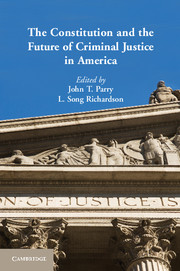Book contents
- Frontmatter
- Contents
- Contributors
- Acknowledgments
- Introduction
- Part I Foundations – The Scope of Criminal Law and Access to Counsel
- Part II Race and Criminal Procedure
- Part III Policing and Privacy
- Part IV Technology and the Surveillance Society
- Part V Confessions and miranda
- 10 False Confessions and the Constitution
- 11 The Foggy Future of Miranda
- Part VI Conviction, Sentencing, and Incarceration
- Part VII Emergencies and Borders – Immigration, Terrorism, National Security, and Transnational Crime
- Index
- References
11 - The Foggy Future of Miranda
Published online by Cambridge University Press: 05 June 2014
- Frontmatter
- Contents
- Contributors
- Acknowledgments
- Introduction
- Part I Foundations – The Scope of Criminal Law and Access to Counsel
- Part II Race and Criminal Procedure
- Part III Policing and Privacy
- Part IV Technology and the Surveillance Society
- Part V Confessions and miranda
- 10 False Confessions and the Constitution
- 11 The Foggy Future of Miranda
- Part VI Conviction, Sentencing, and Incarceration
- Part VII Emergencies and Borders – Immigration, Terrorism, National Security, and Transnational Crime
- Index
- References
Summary
Any police television show on any given night will almost invariably include a police officer telling a suspect the familiar refrain: “You have the right to remain silent. Anything you say can and will be used against you in a court of law. You have the right to an attorney. If you cannot afford an attorney, one will be provided for you.” While knowledge of the Miranda warnings is nearly ubiquitous, what happens when officers fail to administer Miranda warnings is not as well understood.
Before the Supreme Court decided Miranda in 1966, the Court evaluated the admissibility of suspects’ confessions by using a voluntariness test. Guided by the assumption that coerced confessions are inherently untrustworthy, the Court held that a confession must be voluntary in order to be admitted into evidence. The two constitutional bases for this requirement were the Fifth Amendment right against self-incrimination and the due process clause of the Fourteenth Amendment. Initially, courts relied almost exclusively on the due process clause, but after the Supreme Court held that the Fifth Amendment’s self-incrimination clause is incorporated in the due process clause of the Fourteenth Amendment and thus applies to the states, courts began to rely more heavily on the Fifth Amendment when evaluating the admissibility of suspects’ confessions.
- Type
- Chapter
- Information
- The Constitution and the Future of Criminal Justice in America , pp. 187 - 202Publisher: Cambridge University PressPrint publication year: 2013
References
- 1
- Cited by



